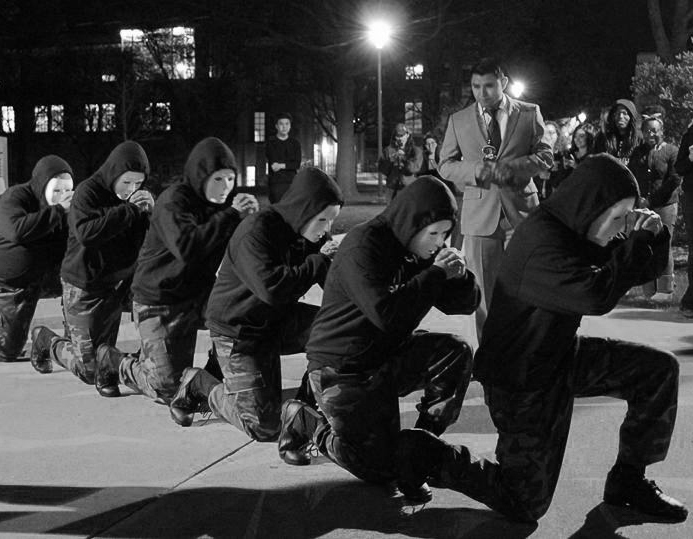A Greek tradition reignited
UNI Colony’s gamma line, pictured at the end of their salute to their pledgemaster, is done out of respect for teaching the new members what it means to be a member of Lambda Theta Phi.
Sep 18, 2017
Lambda Theta Phi Latin Fraternity Incorporated is new to most students on campus at UNI. However, the fraternity has a storied history in the US that highlights the uniqueness of Latin American culture.
According to the Lambda Theta Phi website, Lambda Theta Phi was founded in 1975 on the campus of Kean College in New Jersey. The UNI Colony was founded in 2008, and the torch was recently reignited on campus by senior psychology major Oliverio Covarrubias and six other brothers.
“We have an interest group each time; we have them do 10 events and then from there they decide,” Covarrubias said. “We don’t have pledge classes per se, because a lot of black and brown organizations step or stroll or, in our case, salute.”
Covarrubias is a member of gamma line, the third line at UNI. Lines are not only the initiation “class” of an individual chapter, but also the group brothers that salute together.
“Everyone who crossed with me, they are my line brothers — or LBs for short,” Covarrubias said.
According to Covarrubias, “crossing” is the last step in initiation. The new members “cross” into the organization.
He said that names and numbers are unique to minority greek life and play a big role not only in the organization of members, but in the identity of members as a part their particular line.
“My line name is Cosmos, and I am the ace or the first, of the line,” Covarrubias said. “At least with gamma line, I will always be in front.”
Covarrubias also noted that the ideals of multicultural greek organizations are at the forefront of everyday life for their members.
“Not to diminish or devalue any white fraternal organizations’ values […] they are often abstract concepts about how to better yourself and your community,” Covarrubias said. “Whereas black and brown fraternities — they have [abstract] values as well — but an underlying one is advocacy for those communities.”
Covarrubias views the philanthropies of white fraternities as the advocacy they focus on, but also noted that it stands apart from the critical role of advocacy in minority fraternities.
According to Covarrubias, advocacy still plays a large role in the activities of Lambda Theta Phi.
“We were founded out of a need to advocate for latino students,” Covarrubias said. “That’s kind of been an underlying theme. Getting involved with a latino organization, a lot of brothers are very vocal politically because of our status as brown folk in America. There’s this underlying ‘Well we always have to watch ourselves and our community.’”
According to Covarrubias, Lambda Theta Phi’s philanthropy is the Congressional Hispanic Caucus Institute (CHCI). The goal of the institute is to connect young hispanic interns with lawmakers in D.C.
“Part of public administration is representative government,” Covarrubias said. “If we don’t have people in levels of government who are black or latino or gay or trans — we’re going to miss out on those experiences.
“A lot of policy is determined by experience, if you don’t have people who have experienced these things, you’re not going to have good policy.”
According to Covarrubias, CHCI is a more abstract philanthropy than many, but it is important to the communities that it serves.
“It’s an abstract thing for us to sell because it’s like ‘Politics! Yeah, interns!’” Covarrubias said. “It’s not as easy as saying ‘Money for cancer.’ For five cents a day, you could send this high schooler to D.C. where he can be an intern for two months. That doesn’t seem like much.”
Covarrubias also emphasized the importance of making connections in politics and the difficulty that minority populations often have making those connections.
CHCI gives students a way in so that they can be involved in politics and give back to the greater community.
“You have to have people on the inside to have change on the outside,” Covarrubias said.















